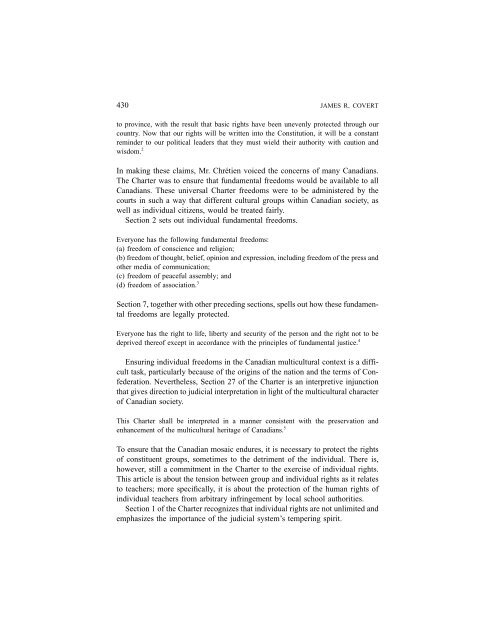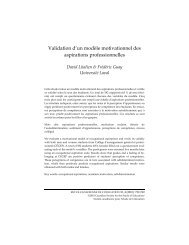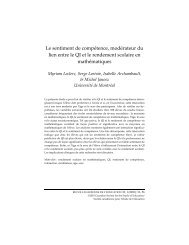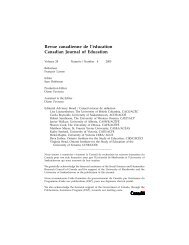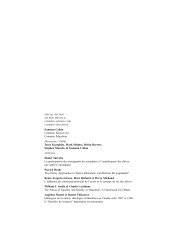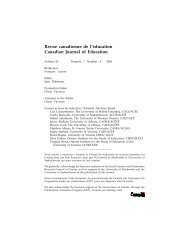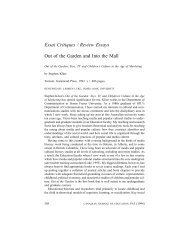Mireille Falardeau et Michel Loranger Le choix de stratégies ... - CSSE
Mireille Falardeau et Michel Loranger Le choix de stratégies ... - CSSE
Mireille Falardeau et Michel Loranger Le choix de stratégies ... - CSSE
Create successful ePaper yourself
Turn your PDF publications into a flip-book with our unique Google optimized e-Paper software.
430 JAMES R. COVERT<br />
to province, with the result that basic rights have been unevenly protected through our<br />
country. Now that our rights will be written into the Constitution, it will be a constant<br />
remin<strong>de</strong>r to our political lea<strong>de</strong>rs that they must wield their authority with caution and<br />
wisdom. 2<br />
In making these claims, Mr. Chrétien voiced the concerns of many Canadians.<br />
The Charter was to ensure that fundamental freedoms would be available to all<br />
Canadians. These universal Charter freedoms were to be administered by the<br />
courts in such a way that different cultural groups within Canadian soci<strong>et</strong>y, as<br />
well as individual citizens, would be treated fairly.<br />
Section 2 s<strong>et</strong>s out individual fundamental freedoms.<br />
Everyone has the following fundamental freedoms:<br />
(a) freedom of conscience and religion;<br />
(b) freedom of thought, belief, opinion and expression, including freedom of the press and<br />
other media of communication;<br />
(c) freedom of peaceful assembly; and<br />
(d) freedom of association. 3<br />
Section 7, tog<strong>et</strong>her with other preceding sections, spells out how these fundamental<br />
freedoms are legally protected.<br />
Everyone has the right to life, liberty and security of the person and the right not to be<br />
<strong>de</strong>prived thereof except in accordance with the principles of fundamental justice. 4<br />
Ensuring individual freedoms in the Canadian multicultural context is a difficult<br />
task, particularly because of the origins of the nation and the terms of Confe<strong>de</strong>ration.<br />
Nevertheless, Section 27 of the Charter is an interpr<strong>et</strong>ive injunction<br />
that gives direction to judicial interpr<strong>et</strong>ation in light of the multicultural character<br />
of Canadian soci<strong>et</strong>y.<br />
This Charter shall be interpr<strong>et</strong>ed in a manner consistent with the preservation and<br />
enhancement of the multicultural heritage of Canadians. 5<br />
To ensure that the Canadian mosaic endures, it is necessary to protect the rights<br />
of constituent groups, som<strong>et</strong>imes to the d<strong>et</strong>riment of the individual. There is,<br />
however, still a commitment in the Charter to the exercise of individual rights.<br />
This article is about the tension b<strong>et</strong>ween group and individual rights as it relates<br />
to teachers; more specifically, it is about the protection of the human rights of<br />
individual teachers from arbitrary infringement by local school authorities.<br />
Section 1 of the Charter recognizes that individual rights are not unlimited and<br />
emphasizes the importance of the judicial system’s tempering spirit.


